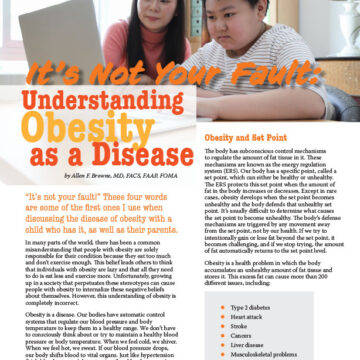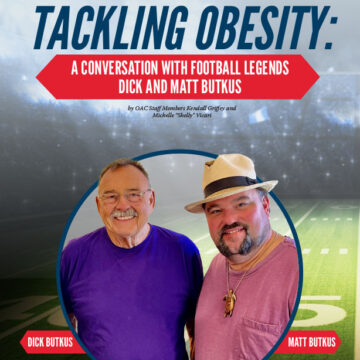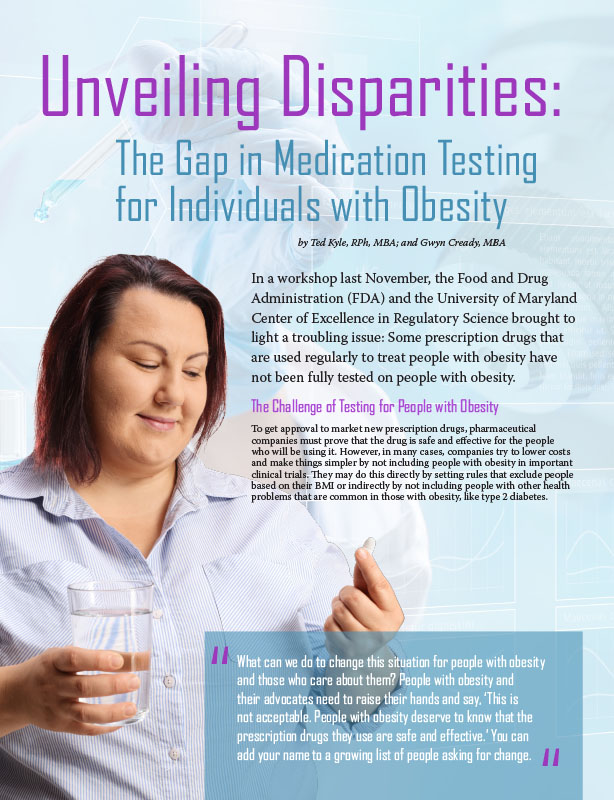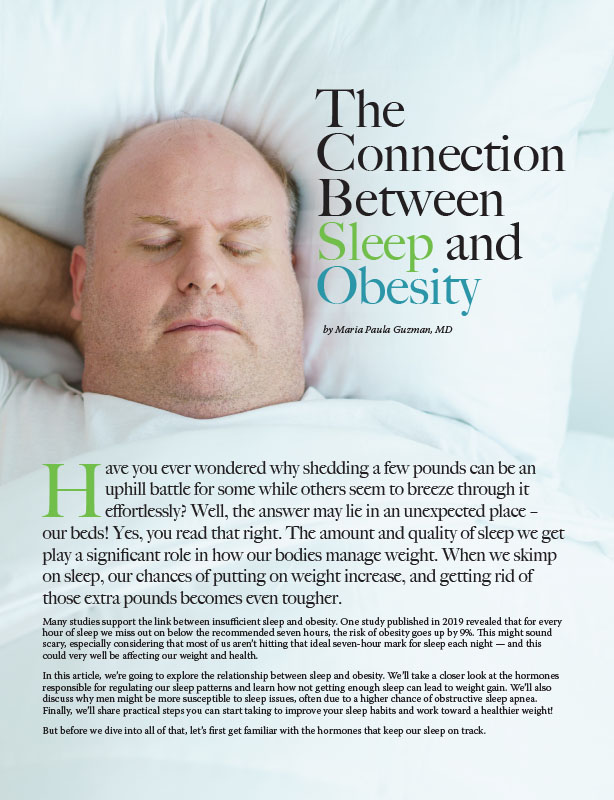Weight Bias: Fighting for Change from the Inside Out

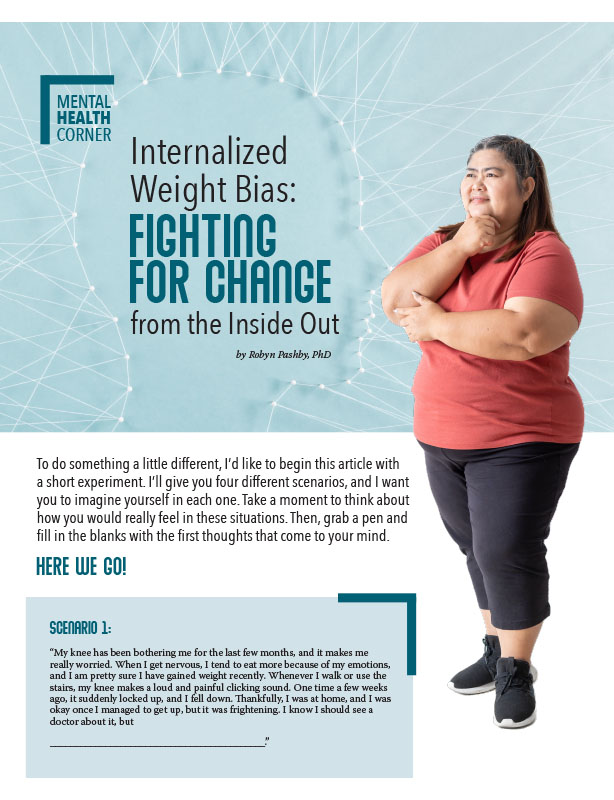
by Robyn Pashby, PhD
Summer 2023
To do something a little different, I’d like to begin this article with a short experiment. I’ll give you four different scenarios, and I want you to imagine yourself in each one. Take a moment to think about how you would really feel in these situations. Then, grab a pen and fill in the blanks with the first thoughts that come to your mind.
Here we go!
Scenario 1:
“My knee has been bothering me for the last few months, and it makes me really worried. When I get nervous, I tend to eat more because of my emotions, and I am pretty sure I have gained weight recently. Whenever I walk or use the stairs, my knee makes a loud and painful clicking sound. One time a few weeks ago, it suddenly locked up, and I fell down. Thankfully, I was at home, and I was okay once I managed to get up, but it was frightening. I know I should see a doctor about it, but___________________________________________.”
Scenario 2:
“I am throwing a party at my house to celebrate a milestone birthday in my family. I invited many friends, neighbors, and even my extended family. I have carefully planned the decorations, music and menu. On the day before the party, I go to the grocery store to buy all the food I need. While I walk around the store picking out different snacks, drinks and other items, including a large custom-made cake, I see a woman looking at my shopping cart. Suddenly, I start feeling uneasy and think to myself:________________________________________.”
Scenario 3:
“After being single for a long time, I have finally found the courage to try online dating, which I have been avoiding. I am tired of feeling lonely, and many of my friends have dating profiles too. Some of them have even offered to help me create my account. I log onto the dating app for the first time and begin building my profile. It asks me to submit some ‘recent photos’ of myself and to describe my ‘body type.’ I immediately think:__________________________________________.”
Scenario 4:
“I really want to start exercising more because it makes me feel so much better. When I work out a few times a week, I feel great. Before the pandemic, I used to go to the gym in my neighborhood, but unfortunately, it closed down. I haven’t been exercising for a few years, and I’ve noticed that I’m stiffer and more sore now. During the pandemic, I also gained some weight. Lately, I’ve been taking short walks around my neighborhood, but I think it would be beneficial for me to join a gym again. There’s actually a new gym that opened up, and it’s even closer to my home than the old one. However, I’ve been hesitating to go and check it out. I felt so comfortable in my old gym. I knew everyone there. Whenever I picture myself walking into this new place, I think:___________________________________________.”
These are just a few examples from my years of work with clients who have dealt with internalized weight bias. I have altered the details to protect privacy, but the scenarios are based on real stories my clients have shared. It’s not surprising that the blank parts often reveal fears of being judged or rejected, expressions of low self-esteem and similar sentiments.
If you haven’t written down your answers, I encourage you to reread the examples and give it a try. Why? Because internalized weight bias can be difficult to recognize if you have lived with it for many years, or even decades. I compare it to gravity — something that is always present, greatly impacting our lives, but often goes unnoticed. Internalized weight bias hides in the shadows of your self-talk, whispering that you’re not good enough, that you don’t look right, that you’re not doing things well enough, and so on… all because of your weight. When you review how you completed the previous sections, what do you notice about your own thoughts?
Identifying Internalized Weight Bias
Internalized weight bias is formally defined as self-directed shaming and negative weight-related attitudes and stereotypes about oneself (Pearl & Puhl, 2018). It develops as a result of repeated experiences with external weight bias and stigma over time. Bias can stem from various sources, such as medical offices, schools, families, social circles, grocery stores and gyms. These experiences can range from subtle, like receiving disapproving glances from strangers, to overt, such as a doctor dismissing your pain and failing to diagnose a serious medical condition.
It’s important to note that your body shape, size or weight should never determine the level of medical care you deserve, how you are treated in a store, or the care you receive from friends and family. However, in real-life situations like the ones described earlier, weight bias often plays a role. This is why weight bias is detrimental, both physically and emotionally.
It’s no secret that individuals living with obesity often face (mis)judgment from medical providers. I have frequently heard stories of people with knee, hip or back pain being told to simply lose weight as a solution to their pain. When you reflect on your response to scenario 1, you may notice that your thoughts expressed a fear of being judged or a desire to please others. Perhaps you wrote down statements like, “I’ll make that appointment after I’ve lost some weight” or “There’s nothing they can do for me anyway, so I just need to try harder.” These thoughts reflect a brain that is trying its best to protect or warn you about the potential harm of encountering weight bias.
In some ways, your brain is attempting to be helpful (albeit in a misguided way) by urging you to postpone or avoid the upcoming doctor’s appointment. It is trying to shield you from the embarrassment, shame and pain associated with weight bias. Unfortunately, these thoughts also indicate a belief deep down inside that you don’t deserve medical care at this moment, in your current body. This belief often leads to prolonged pain and feelings of inadequacy for not being “disciplined” enough to lose weight and alleviate your pain. Over time, experiences of weight bias can become ingrained in your own beliefs and self-perception. You start to believe that such treatment is justified and that you deserve to be treated as less than because of your weight. This is the essence of internalized weight bias.
The Dangers of Internalized Weight Bias
It is obvious that missing a medical diagnosis can be dangerous. However, we must also recognize that believing your weight makes you unlovable, unworthy and inadequate is equally dangerous. It can lead to depression, anxiety, disordered eating, avoidance of social situations, increased sedentary behavior and more.
When you encounter bias from a doctor, a family member or a stranger, you may have noticed you respond in one of several types of ways. You might feel anger and decide to fight against bias by confronting the person or joining an advocacy group that works towards combating weight bias. Alternatively, you may shut down emotionally, try to numb the pain or create distance from it. Many clients have shared experiences of turning to binge eating as a coping mechanism for the pain caused by weight bias. Some individuals may attempt to lose weight rapidly in an effort to “fix” the problem.
These responses are normal reactions to threats. The fight, flight and fawn responses are your brain’s way of attempting to cope with the overwhelming message that you are deemed unacceptable simply for being yourself. Over time, as internalized bias accumulates, you may unintentionally become a “perpetrator” within your own thoughts. When your own self-perception aligns with what you have been told (that you are not okay because of your weight), you have internalized weight bias.
Overcoming Negative Self-Perceptions
So, what can you do about it? Coping with internalized bias is a process that requires time and effort. Contrary to popular belief, the solution does not lie in weight-loss. In fact, unaddressed internalized weight bias can affect individuals at any point in their weight journey. Instead of fixating on weight or weight-loss, the first step in combating internalized bias is recognizing the unacceptability, discrimination and harm caused by external weight bias. Once you become aware of it, you cannot unsee it — I assure you.
Next, it’s important to acknowledge how external weight bias has influenced you. As you begin to notice your own internalized bias, you might be surprised by the number of thoughts, beliefs and behaviors that are entangled within it. Engaging in exercises like the scenarios presented at the beginning of this article helps uncover some of your own internalized bias. Since internalized bias manifests in your self-talk, becoming aware of how you speak to yourself is a crucial foundation for change.
Finally, start challenging those unhelpful thoughts. One technique is to consider how you would never, under any circumstances, speak to someone you love the way you speak to yourself. Can you imagine telling your mother or sister to “lose some weight” before they see a doctor for back pain? Would you advise your 20-something daughter to only post headshots on her dating profile because her body might be disliked? Would you tell your best friend not to join the new neighborhood gym because he is “too big” to fit in? Ouch, right? Why is it easier to treat others with compassion while treating ourselves harshly? Partly because underlying your self-critical inner dialogue are likely deeply painful beliefs about your own self-worth, fueled by internalized weight bias.
Conclusion
Changing your internalized bias is a process that is achievable with time and support. Seeking assistance from communities that promote science-based, non-judgmental information about weight and health, such as the OAC, can be helpful. However, in addition to seeking support and challenging your inner self-talk, if you find yourself struggling with internalized bias or suspect that you may be experiencing depression or anxiety, reach out for help. You can consult the OAC’s provider directory at ObesityCareProviders.com for psychologists or other mental health professionals in your area. Additionally, you can check your insurance website, consult with your doctor or visit psychologytoday.com for more search options.
Regardless of the path you choose, remember that addressing your own internalized bias is a worthwhile endeavor. It takes time and patience, but change is possible. Together, let’s fight not only against weight bias but also against internalized bias.
About the Author:
Robyn Pashby, PhD, is a clinical health psychologist who is deeply committed to the mission of the OAC. She has personal experience with obesity and comes from a family with a history of obesity. Over the past 15 years, Dr. Pashby has dedicated her work to integrating mental healthcare into obesity treatment. She has done this in various multidisciplinary settings and, most recently, through her own behavioral health group practice.
by Robyn Pashby, PhD Winter 2024 “No one is ever going to date you if you don’t…
Read Articleby Ted Kyle, RPh, MBA; and Gwyn Cready, MBA Fall 2023 In a workshop last November, the…
Read Articleby Maria Paula Guzman, MD Have you ever wondered why shedding a few pounds can be an…
Read Article




